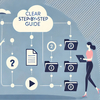
Many of us come into technical writing from different and often unrelated writing fields. I, for one, have a degree in journalism, and for the past ten years I have been writing fiction and poetry, while also working with Web content and development.
At first I thought that technical writing would be boring, though possibly more lucrative than creative writing. The more I learn about it, however, the more I realize that technical writing is far from unexciting.
Technical writing is about tools
For me, the main difficulty in learning technical writing hasn’t been adapting to the different writing style, but adapting to the different tools it requires.
I started looking into technical writing because I like technology. I enjoy playing with my devices, I like trying new applications and learning new features for old ones. I could spend unlimited hours on Photoshop – I sometimes blow it kisses when it opens on my laptop, that’s how much love there is between us. My e-book reader comes with me everywhere and has convinced me that I never need paper books ever again.
But technology is not only about having fun. It’s about being open to learn all the time, again and again, over and over. And technical writing is no different.
I am studying for what feels right now like a very intense technical communication certificate. I expected that it would be challenging. I knew that I would have to adapt and learn to write in a completely different way, because technical writing is no poetry, that’s for sure (I expected that it would be thoroughly boring). But I thought that the technical knowledge I had would be sufficient to help me through. I mean, I know almost anything Word can do, I can handle Photoshop tools quite proficiently (and lovingly, as already shown) and I can also work with Web development tools, like Dreamweaver. What more would there be? Well, apparently there is quite a bit more, like Illustrator, and InDesign and FrameMaker and Visio and Flare and RoboHelp, and others.
Browser-based tools are scary but convenient
While having to face the reality of the numerous tools without which apparently I couldn’t be a technical writer, I encountered another hurdle: many of these tools don’t work on a Mac, which is the only system to which I have access right now.
I’ve had to adapt again and find Mac-friendly applications. Many of these applications are browser-based, and this has been another psychological barrier that I had to overcome.
Like so many of us, I do almost everything online. Even the technical communication certificate I am pursuing is entirely online. When the Internet stopped working at my house a few weeks ago, although we still had running water, electricity, and even cable, I felt like we were camping in the woods: an unpleasant and undesirable experience (apologies to those of you who are campers, but it’s really not my thing).
However, I had a hard time trusting an application that doesn’t reside on my system. What if my files just vanish, since I don’t know where they are stored? What if I lose my login information and I’m never able to find my work again? What if my browser crashes, and I haven’t saved my work, and I lose everything?
For my technical writing courses I’ve had to work with at least three browser-based applications: an HTLM editor, a flowchart creator, and a help-authoring tool. I felt intimidated and uncomfortable, but I also had no choice, so I gave them a try.
Browser-based tools work
Despite my initial resistance, all these applications provided me with more pleasant and successful learning experiences than applications that I had to download on my computer and use locally.
For one, the applications were integrated into complex websites and were accompanied by a host of help and learning opportunities that popped up exactly when needed: videos, written tutorials, demonstrations, and even live, in-person contact with support. With a local application, I’d barely know how to find a learning aid, often getting errors and often having to go online anyway.
The browser-based applications also updated and saved my work regularly and the browser somehow never crashed while I was working. Even if by mistake I closed it (because track pads are sometimes evil), I found it easy to log in again, if necessary, and resume my work.
After struggling with the first two tools in my course, the third one was just a pleasure. I knew it would work. I had no reservations anymore.
Tools make technical communication fun
Learning technical writing has proven challenging in many ways, but the most challenging aspects of it have also been the most exciting. Cliché and very true. The feeling that I get looking at my complex documents with tables of contents, indexes, and many levels of content, created in no more than a week with tools that I had never seen before, is a great feeling. It’s something I want to experience again. It’s a feeling I’m recommending. Try it. Try new tools that intimidate you. Don’t let anyone tell you that technical communication can be anything but extremely stimulating and many times even fun.
About the author – Lori Tiron-Pandit
Lori Tiron-Pandit is a writer, editor, and translator of Romanian origin. She has a BA in Journalism from Bucharest University. Her experience includes fiction writing, print magazine writing and editing, web and content development, as well as fiction, non-fiction, and poetry translation. She is currently pursuing an online Technical Communication certification from UCSD Extension.
Her first novel, Spell of Blindness, was published in 2012, and she is currently working on a second book.
You can find out more about her work at www.loritironpandit.com.
Happy Documentation Writing!
ClickHelp Team – Online Documentation and Technical Writing Tools



